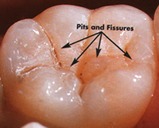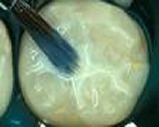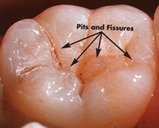Seal in time saves nine
Methods of preventing you teeth from bacteria and cavities.



Dental sealants (also termed pit and fissure sealants, or simply fissure sealants) are a dental treatment intended to prevent tooth decay. Teeth have recesses on their biting surfaces; the back teeth have fissures (grooves) and some front teeth have cingulum pits. The chewing surfaces of our teeth are not flat, but they are cris crossed with hills and valleys allowing food particles to be trapped in the pits and fissures .Thus permitting oral bacteria to feast on them and causing tooth decay in the process. In a nutshell, our teeth have to bear the brunt of all that we eat.
One method of preventing cavities from developing in the pits and fissures is to seal them off with a special varnish called a pit and fissure sealant. If your dentist determines that you need a pit and fissure sealant to help protect your teeth from decay, some special steps are taken to prepare the teeth first.
Your dentist will clean the tooth first, then apply a mild acid solution to ‘etch’ the surface and make it easier for the pit and fissure sealant to stick. The whole procedure is quick and painless. Keeping the area dry and away from your saliva during the application is very important. Once everything is ready, your dentist ‘paints’ the sealant right over the pits and fissures on the tooth surface. A special kind of light cures the sealant and makes it ready for use.
Your teeth are constantly being covered with a sticky film of bacteria, called plaque. When we eat or drink anything that contains sugar or starch – such as milk, bread, biscuits, toffee, aerated drinks, juice, fruit and many other foods and beverages-bacteria turn the sugar and starch into acids that can attack tooth enamel. For some people, repeated attacks may eventually result in decay.
One of the most common places that tooth decay develops is on the chewing surfaces of the back teeth, the premolars and molars. When you run your tongue along the chewing surfaces of the back teeth, you can feel depressions and grooves. These indentations, called pits and fissures, help to grind food.
Because the grooves on the back of your teeth are hard to keep clean, your dentist may recommend dental sealants. A dental sealant is plastic material that is applied to a chewing surface of a back tooth. The sealant acts as a barrier, protecting enamel by “sealing out” plaque and food.
Sealants are easy to apply, and it takes only a few minutes to seal each tooth & it is a “painless “procedure, First the teeth that will be sealed are cleaned and prepared to accept the sealant. The sealant is then ‘painted’ onto the tooth enamel, where it bonds directly to the tooth and hardens. Sometimes a special curing light is used to harden the sealant. Sealants are generally clear or white and cannot be seen when you smile or talk.
As long as the sealant remains intact, the tooth’s chewing surfaces will be protected from plaque and food. Sealants, which hold up well under the force of everyday chewing, can last a few years before a reapplication is needed. However, it is important to see the dentist regularly to check that the sealant remains intact.
The likelihood of developing tooth decay on the chewing surfaces begins shortly after teeth come into the mouth, so children and teenagers are obvious candidates for sealants. Adults can benefit from sealants too, because you never “outgrow” the risk for developing cavities.
Dental sealants can help prevent decay. They can also help you save time and money that would have been spent on restorative dental procedures. In order to keep your smile healthy, brush twice a day with toothpaste prescribed by your dentist. You should clean between your teeth with floss once a day, visit your dentist regularly and avoid frequent between –meal snacks.



- No Gap (For Private Dental Health Insurance Patients)
- Not With Health Fund, Just pay $179
Shop 3, Ground Floor, 101-107 Oxford
street, Bondi Junction NSW 2022
Phone: 02 9387 3181
Fax: +61 93877570
Email: bondi@dentallifeline.com.au
178 Mann street Gosford 2250.
Phone: 02 4323 7007
Fax: +61 4323 7009
Email: gosford@dentallifeline.com.au
Shop 3/135 Pacific Highway Hornsby
Phone: 02 9476 0070
Email: hornsby@dentallifeline.com.au
106 Victoria Street, East Maitland.
Opening Soon…
Copyright © 2024 Dental Lifeline | All Rights Reserved.